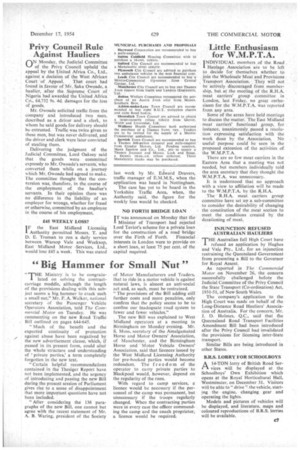Privy Council Rule Against Hauliers
Page 45

If you've noticed an error in this article please click here to report it so we can fix it.
I—IN Monday, the Judicial Committee of the Privy Council Upheld the appeal by the United Africa Co., Ltd., against a decision of the West African
Court of Appeal. That court had found in favour of Mr. Saka Owoade, a haulier, after the Supreme Court of Nigeria had awarded the United Africa Co., £4,732 95. 4d. damages for the loss of goods.
Mr. Owoade solicited traffic from the company and introduced two men, described as a driver and a clerk, to whom he said goods for delivery should be entrusted. Traffic was twice given to these men, but was never delivered, and the driver and clerk were later convicted of stealing them.
Delivering the judgment of the Judicial Committee, Lord Oaksey said that the goods were committed expressly to Mr. Owoadc's servants, who converted them while on a journey which Mr. Owoade had agreed to make. The committee thought that the conversion was, therefore, in the course of the employment of the haulier's servants. In their opinion there was no difference in the liability of an employer for wrongs, whether for fraud or otherwise, committed by an employee in the course of his employment.
145 WEEKLY LOSS?
IF the East Midland Licensing I Authority permitted Messrs. T. and D. E. Truman to run a daily service between Warsop Vale and Worksop, East Midland Motor -Services, Ltd., would lose £45 a week. This was stated
last week by Mr. Edward Dravers, traffic manager of E.M.M.S., when the application was heard in Nottingham.
The case has yet to be heard in the Yorkshire Traffic Area, when, the Authority said, the figure for the weekly loss would be checked.
NO FORTH BRIDGE LOAN IT was announced on Monday that the I Minister of Transport had rejected Lord Teviot's scheme for a private loan for the construction of a road bridge over the Firth of Forth. Financial interests in London were to provide on a short loan, at least 75 per cent. of the capital required.












































































































